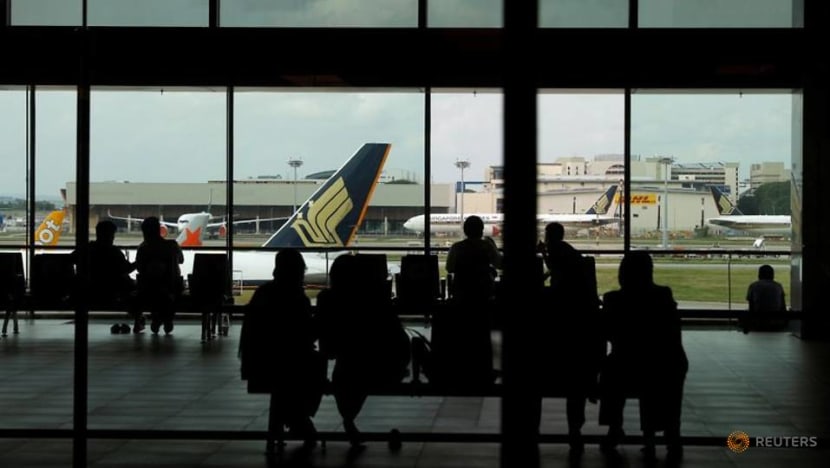COVID-19: Singapore to stop entry for all long-term pass holders, short-term visitors with recent travel history to India

FILE PHOTO: People look at a Singapore Airlines plane, amid the spread of the coronavirus disease (COVID-19), at a viewing gallery of the Changi Airport in Singapore October 12, 2020. REUTERS/Edgar Su
SINGAPORE: All long-term pass holders and short-term visitors with recent travel history to India within the last 14 days will not be allowed entry into Singapore from Apr 24, announced the Ministry of Health (MOH) on Thursday (Apr 22).
This includes visitors who transit in India, and all who had obtained prior approval for entry into Singapore.
India's COVID-19 situation has worsened in recent days, with daily records of new cases.
Many of the new arrivals from India work in the construction, marine and process sectors and live in the dormitories, noted Mr Lawrence Wong, co-chair of the COVID-19 multi-ministry task force.
“We know that this major move will have an impact on our construction, marine and process sectors. And many local SMEs and contractors will be badly impacted," he said at a press conference on Thursday.
“The Government will be looking at providing additional support measures to help these companies.”
There is no evidence that the recent cases at the Westlite Woodlands Dormitory are linked to a new strain from India, said Mr Wong, who is also the Education Minister.
“Even if they were to serve out the stay-home notices, we know that that is never 100 per cent foolproof, and leaks can still happen,” he added.
“And if such a leak were to happen amongst new Indian arrivals working in these sectors, then a new strain may get leaked into the dormitory and worse, even recovered or vaccinated workers may get infected and then we may see new clusters emerging again in our dormitories.”
READ: Measures put in place at Westlite Woodlands dormitory after 17 recovered workers test positive for COVID-19 again
The new measure may affect the progress of construction projects, including homes, said National Development Minister Desmond Lee in a Facebook post.
"We will work with Housing & Development Board, private developers and construction companies to see how their projects can be brought back on track," said Mr Lee.
STRICTER MEASURES
The Health Ministry also announced on Thursday that all travellers with recent travel history to India who have yet to complete their 14-day stay-home notice by 11.59pm on Thursday will need to serve their additional seven-day stay-home notice at dedicated facilities instead of their place of residence.
Describing the new measures as a “temporary freeze” on arrivals from India, Mr Wong said this will give Singapore time to monitor the situation there and better understand the “new variants that are there and the risk that they pose to us”.
Responding to questions about the impact on the construction, marine and process sectors, Minister for Health Gan Kim Yong said: “These measures are necessary because you can imagine that the alternative is to have an influx of cases, and in fact they may transmit to our dormitories, to our community, and we end up with a major outbreak again.
“If that happens, many more companies will be affected. Many more workers will be affected, and the economy will be … affected more badly than what we could see now with these measures.”
Adding that Singapore is also concerned with healthcare capacity, Mr Gan said: “We want to do what we can to minimise the risk of the next cluster and the next wave, so that we have sufficient capacity of our healthcare facilities to be able to respond should that eventuality happen.”
READ: Singapore may have ‘further rounds’ of COVID-19 vaccination: Lawrence Wong
“The situation we are in reminds us once again of how unpredictable and volatile the pandemic can be. It’s been more than one year since we’ve started this fight against COVID. Things are fluid, they change rapidly, and we have to be prepared,” said Mr Wong.
“We are facing an invisible and a very formidable enemy. And the new strains of the virus that we see in many other countries are worrying because it suggests that we have to continue staying on guard, even tightening some measures.
“And even perhaps after this round of vaccination, we might have to continue with further rounds of vaccinations, even up to beyond this year, because we will have to be confronting not just the virus today but potentially new strains of the virus that may be more infections and virulent.”
READ: Dormitory residents who have recovered from COVID-19 no longer exempt from routine testing
NEW VARIANTS
Addressing the new variants of the COVID-19 virus, director of medical services Associate Professor Kenneth Mak said that as of Apr 20, Singapore has detected seven local cases of the B117 variant of the virus, or the UK variant, and one local case of the B1351 variant, also known as the South African variant.
The case with the B1351 variant, or Case 61822, works in the marine industry and was exposed to “potentially infectious sources” from ships visiting Singapore, he added.
For the seven cases infected with the B117 variant, all necessary public health actions have been taken to isolate and ringfence these cases, added Assoc Prof Mak.
“And while there has been transmission to members of the same household for three cases amongst these eight cases, there’s not been any further detected community spread.”
Singapore has detected 342 imported cases with the B117, B1351, and P1, P2, and P3 variants, said Assoc Prof Mak.
The P1, P2 and P3 variants are also known as the B11281, B11282 and B11283 variants respectively.
The B1525 and B1617 strains of the virus have also been detected among imported cases into Singapore, he added.
“All these cases have already been placed on stay-home notice or isolated upon arrival in Singapore, and we’ve not detected any further community spread for any of these other variants of interest.”
READ: India COVID-19 variant: What we know so far
In a separate statement on Thursday, MOH said Singapore has seen 46 imported cases of the B1617 variant, or the “double mutation” variant of the virus from India. There have also been five imported cases of the B1525 variant.
Responding to questions about the new variants, Assoc Prof Mak said there is “emerging evidence” that some of the variants may have “an increased risk of breakthrough”.
“But yet at the same time, for many other variants, this has not been seen.”
Adding that the data for the “double mutation variant” that originated in India is still emerging, Assoc Prof Mak said Singapore is monitoring the situation closely “to see whether this would be a concern particularly for us” with travellers coming into Singapore and the risk of imported cases.
Watch the full news conference and Q&A session:












